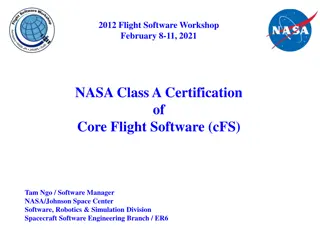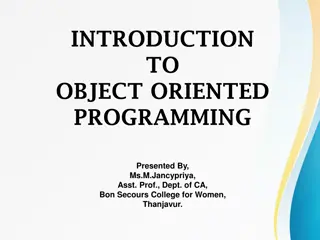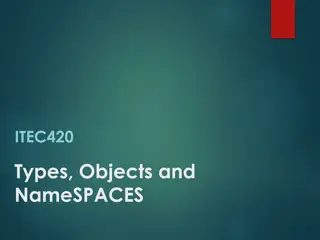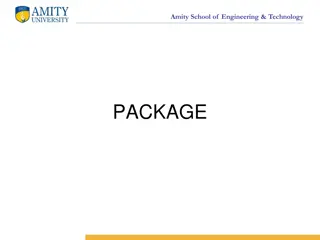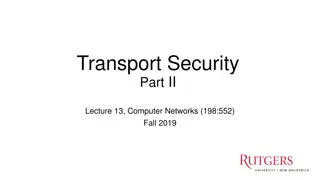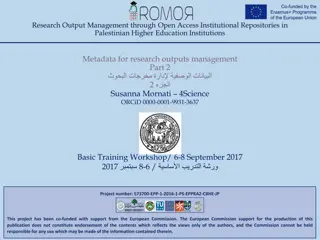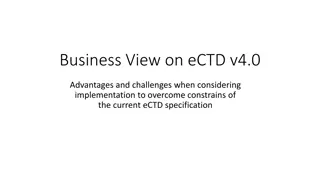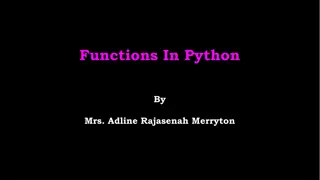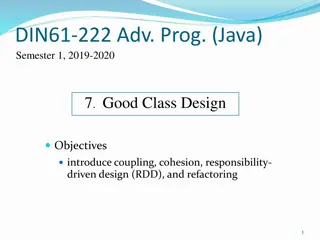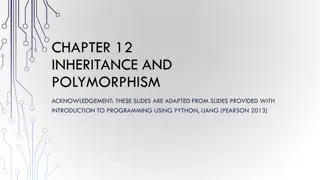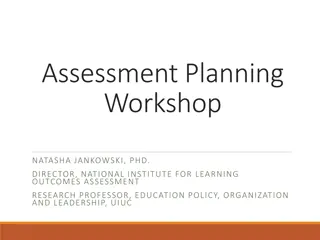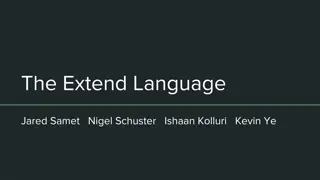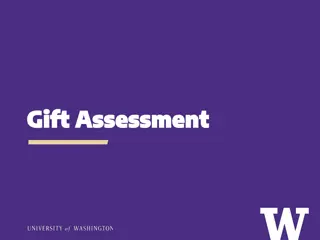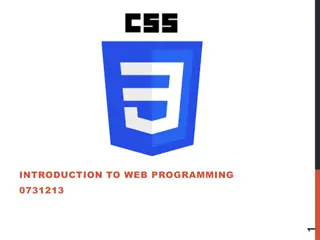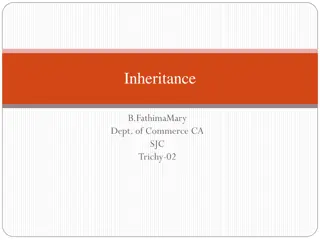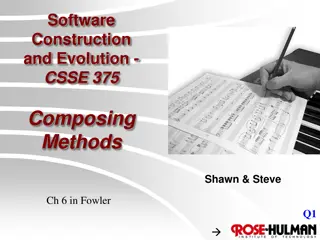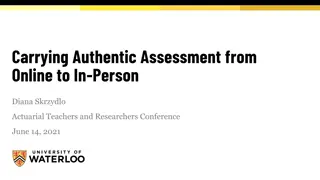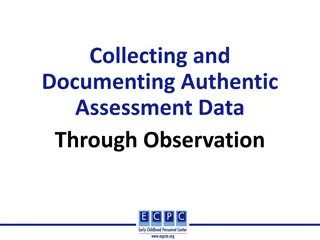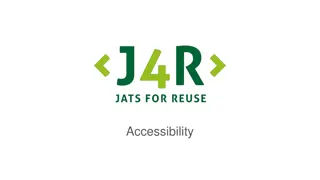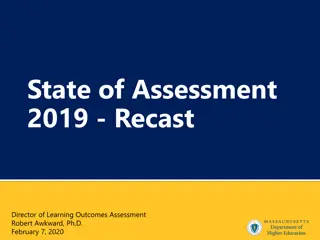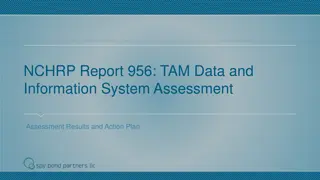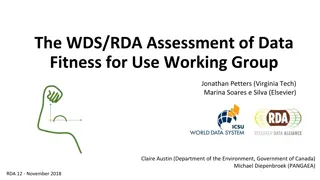Understanding Open Government Data Principles and Benefits
Open Government Data (OGD) principles and policies play a vital role in promoting transparency, citizen engagement, innovation, and data-driven decision-making in government operations. Governments worldwide are adopting open data policies to enhance accessibility, reusability, collaboration, privac
0 views • 36 slides
Sheffield Early Help Assessment Form Update and Integration with Extended Support Plan
Sheffield has introduced an updated Early Help Assessment form to streamline the assessment process within the Early Help System. This new form combines the Early Help Assessment with the Extended Support Plan, aligning various assessment tools and referral forms into one comprehensive document. The
5 views • 22 slides
Enhancing Language Learning Through Peer Assessment
Explore the benefits of peer assessment as a valuable tool for language learning, comparing it with self-assessment. Discover the components and challenges of self-assessment, along with the potential of peer assessment to improve accuracy and promote self-regulation. Gain insights into what peer as
3 views • 29 slides
Overview of DSW End Point Assessment Team Leader Level 3
DSW End Point Assessment Team Leader Level 3 provides a clear understanding of the assessment process, ensuring individuals comprehend why and when it occurs, responsibilities involved, and how DSW supports them. It covers topics such as what End Point Assessment entails, assessment design and deliv
1 views • 18 slides
Certification of Core Flight Software (cFS) for NASA's Gateway Program
The project aims to certify the Core Flight Software (cFS) for NASA's Gateway program, ensuring safety-critical flight software for Gateway's modules. The certification work is led by a dedicated team, enabling cost savings across the program. The goal is to deliver a class-A certified cFS bundle wh
1 views • 10 slides
Understanding Object Oriented Programming (OOP) Principles
Object-Oriented Programming (OOP) is a software design approach where programmers define data structures and operations. Key principles include objects, classes, data encapsulation, inheritance, polymorphism, and data abstraction. OOP allows for better organization and reusability of code, fostering
0 views • 15 slides
Packaging of Eggs: Types, Factors, and Methods
Egg packaging is crucial to prevent shell damage and ensure product quality during storage and transportation. Factors affecting packaging include quality maintenance, storage facilities, transport type, distance traveled, climatic conditions, and costs. Various methods, such as using filler trays a
2 views • 10 slides
Understanding Classes and Objects in Programming
In programming, classes are fundamental building blocks that define the structure and behavior of objects. Classes contain properties, methods, and events that allow interaction between objects. Objects are instances of classes, created using the `new` keyword. Classes help organize code, encapsulat
0 views • 29 slides
Understanding Java Packages and Their Importance in Programming
An exploration of Java packages, their role in structuring code, organizing classes, and enhancing code reusability. Learn about built-in and user-defined packages, the Java API's package organization, and the different types of packages available in Java programming. Discover how packages help in c
2 views • 18 slides
Understanding Assessment in Medical Education
Exploring the concepts of assessment in medical education, including defining assessment, types of assessment, reliability, validity, and aligning assessment methods with intended learning outcomes. The importance of constructive alignment and the impact of assessment on learning outcomes are also d
1 views • 12 slides
Understanding Transport Layer Security (TLS)
The lecture discusses key security properties essential for secure communication in computer networks, such as confidentiality, integrity, authentication, and non-repudiation. It elaborates on cryptographic mechanisms for achieving these properties and emphasizes modularity and reusability in implem
1 views • 26 slides
Assessment Matters in Sociology: Enhancing Learning Through Evaluation
Explore the significance of assessment in sociology education, focusing on key questions to evaluate current assessment procedures, review individual course assessments, and develop strategies to enhance student learning outcomes. Delve into the centrality of assessment in the learning process, with
1 views • 15 slides
Research Output Management in Higher Education: Metadata and FAIR Principles
Research in higher education focuses on metadata and FAIR principles for effective research output management. The content discusses the challenges related to metadata standardization and the importance of data findability, accessibility, interoperability, and reusability in scientific data manageme
0 views • 22 slides
Advantages and Challenges of Implementing eCTD v4.0 to Overcome Constraints
Embracing eCTD v4.0 offers advantages like harmonized rules, simplified life cycle activities, improved automation, and reusability of submitted documents. While the benefits are substantial, challenges such as evaluating cost-benefit ratios, ensuring compatibility with evolving IT systems, and adap
0 views • 5 slides
Understanding Functions in Python
Functions in Python can be built-in functions provided by Python or functions defined by the user. They enable code reusability by taking inputs, performing computations, and returning results. Function definition, arguments, max function, type conversions are key concepts explored in Python functio
0 views • 11 slides
Exploring Class Design in Java Programming: Coupling, Cohesion, RDD, and Refactoring
Delve into the world of Java programming with a focus on class design principles such as coupling, cohesion, responsibility-driven design (RDD), and refactoring. Understand the importance of good design for code quality, ease of debugging, maintenance, and reusability. Dive into the adventure of Zuu
0 views • 39 slides
Understanding Inheritance and Polymorphism in Python
Exploring the concept of inheritance in object-oriented programming, specifically in Python, to create a hierarchy of classes where subclasses inherit attributes and methods from a superclass. This approach helps to avoid redundancy and promotes code reusability. The relationship between superclasse
0 views • 11 slides
Insights into Managing Assessment in the Classroom by Assessment Research Group
Explore the importance of standards and assessment in education through the lens of the Assessment Research Group. Gain valuable perspectives on curriculum delivery, understanding the assessment system, learner assumptions, task parameters, and more. Discover how language, structure, and agency play
2 views • 25 slides
Workshop on Assessment Planning by Dr. Natasha Jankowski
Dr. Natasha Jankowski, Director of the National Institute for Learning Outcomes Assessment, conducts a workshop focusing on effective use of assessment data to enhance undergraduate education. The workshop covers areas like evaluating assessment plans, program learning outcomes, and assessment rubri
0 views • 30 slides
Enhancing Understanding through Assessment in Educational Design Workshop
Learn and collaborate on assessment practices in education design at the "Understanding by Design Assessment Focus" workshop. The agenda includes sessions on summative and formative assessment, feedback, reporting, and more. Engage in activities like generating questions, finding destination partner
1 views • 76 slides
Explore the Extend Language for Declarative Programming
Unveil the Extend language, inspired by the restrictions of spreadsheets, offering a declarative programming approach for reusability. Dive into its basic architecture, lazy evaluation of values, variables handling, and syntax for list comprehensions. Discover its current project status, spanning ov
3 views • 19 slides
Institutional Assessment Planning Workshop Feedback and Insights
Feedback and insights from a recent institutional assessment planning workshop led by Dr. Mark Nicholas at FSU S. Warren Conference Center & Inn. Participants provided feedback on the usefulness of the content, presenter knowledge, ability to develop assessment plans, post-training assessment knowle
1 views • 9 slides
Understanding Higher Education Assessment: The Complete Guide
Higher education assessment involves a systematic process of collecting, reviewing, and utilizing information to improve student learning and development. This guide covers the assessment cycle, learning outcomes, the mission behind assessment in higher education, what assessment is and is not, reas
1 views • 36 slides
Understanding SharePoint Development with Becky Bertram
Delve into the world of SharePoint development with expert Becky Bertram as she covers SharePoint features, solutions, development tools, Visual Studio 2010 integration, and various ways to interact with SharePoint. Explore the concept of features in SharePoint, their scopes, reusability, and activa
2 views • 29 slides
Understanding Gift Assessment Process at University of Washington
The Gift Assessment Process at University of Washington involves applying a 5% assessment to select current-use gifts over $1,000 and under $5 million. This assessment supports the university's advancement efforts and institutional priorities by transferring 5% of eligible contributions to the Provo
1 views • 5 slides
Unveiling the Black Box: ML Prediction Serving Systems
Delve into the world of Machine Learning Prediction Serving Systems with a focus on low latency, high throughput, and minimal resource usage. Explore state-of-the-art models like Clipper and TF Serving, and learn how models can be optimized for performance. Discover the inner workings of models thro
0 views • 30 slides
Introduction to Web Programming: Styling HTML with CSS
Styling HTML with CSS is essential for controlling the layout and design of web pages. CSS offers advantages like flexibility, reusability, and easier maintenance but also has drawbacks such as varying browser support. Learn about naming HTML elements, adding style via CSS, and attaching CSS files t
0 views • 34 slides
Overview of Environmental Impact Assessment and Strategic Environmental Assessment Directives
Environmental Impact Assessment (EIA) and Strategic Environmental Assessment (SEA) play crucial roles in evaluating the impact of planned activities on the environment. This content delves into the concept, origins, development, and key elements of environmental assessment, discussing the legal fram
2 views • 35 slides
Evolution of Separate Compilation and Linking in Computing
Separating compilation and linking processes has been crucial for code reusability and program efficiency in computing history. From the early days of manually recalculating addresses to modern linkers and library routines, the evolution has revolutionized how programs are developed and executed on
0 views • 17 slides
Institutional Assessment and Effectiveness Workshop Achievements at SUNY Oneonta
The Office of Institutional Assessment and Effectiveness at SUNY Oneonta has made significant progress in developing assessment protocols and processes, leading to a culture of assessment. This includes completing planning and assessment cycles, establishing objectives and procedures, and aligning u
1 views • 16 slides
Understanding Inheritance in Object-Oriented Programming
Inheritance is a fundamental concept in C++ that allows for the creation of new classes based on existing classes. This enables code reusability, organization, and the implementation of a hierarchical structure in programming. By using inheritance, developers can efficiently model relationships betw
0 views • 20 slides
Refactoring Methods for Composing Code in Software Construction
Explore the key concepts of refactoring methods for composing code in software development. Learn about techniques such as Extract Method and how they can improve code readability, maintainability, and reusability. Understand the process of creating well-named methods and optimizing code structure f
0 views • 23 slides
Oregon Department of Education Assessment and Accountability Resources
Access important information on assessments, accountability, and reporting from the Oregon Department of Education. Find resources on updating assessment records, accessing student scores, and staying informed about assessment requirements for the 2023-24 academic year. Explore links for assessment
0 views • 55 slides
Oregon Department of Education - Assessment Resources and Updates
Explore the Assessment Record Updating Application (ARUA), Accountability Warehouse Extract (AWE), Secure Assessment Reports, and other important tools and information provided by the Oregon Department of Education for assessment data owners, analysts, and partners. Access links for assessment admin
0 views • 54 slides
Enhancing Teaching Assessment for Actuarial Education
Exploring the transition of assessment practices from online to in-person settings, this presentation by Diana Skrzydlo at the Actuarial Teachers and Researchers Conference delves into the purpose of assessment, key principles, and activities for effective evaluation. Discover insights on diagnostic
0 views • 10 slides
Authentic Assessment through Systematic Observation: Best Practices
Explore the process of authentic assessment through systematic observation in early childhood education. Learn about collecting, documenting, and interpreting assessment data using evidence-based practices and technology. Discover the importance of working collaboratively with families and professio
0 views • 53 slides
Enhancing Scholarly Content Reusability through Accessibility in JATS XML
Explore the importance of accessibility in JATS XML for scholarly content reusability. Understand the significance of meeting accessibility recommendations, implications for different reader groups, and the impact on creating accessible documents in various formats. Delve into key questions guiding
0 views • 27 slides
Assessment Practices in Higher Education Institutions
Dive into the state of assessment for the year 2019, featuring insights on hosting assessment days, establishment of assessment committees, implementation of institutional and program learning outcomes, appointment of a Director of Assessment, compensation for faculty members focusing on assessment,
0 views • 8 slides
NCHRP Report 956 TAM Data and Information System Assessment
This content provides an overview of NCHRP Report 956 focusing on the TAM data and information system assessment results and action plan. It includes details on assessment outcomes, recommendations, implementation action plans, and tools for self-assessment and improvement methodology. The content a
0 views • 21 slides
Enhancing Data Reusability: Challenges and Strategies
The WDS/RDA Assessment of Data Fitness for Use Working Group addresses common challenges faced by researchers in utilizing data from repositories, emphasizing the importance of comprehensive assessment and reliability. The focus is on improving the reusability of datasets by ensuring they meet quali
0 views • 43 slides




